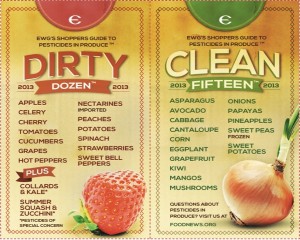
The “Dirty Dozen™” & “The Clean 15™”
Have you ever wondered which fruits and vegetables contain the most pesticides? Probably not. But maybe you will now.
The Environmental Working Group is an environmental health research and advocacy organization. They annually release their list of the “Dirty Dozen,” which are fruits and vegetables exposed to the highest amounts of pesticides based on testing data generated by U.S. Department of Agriculture scientists and the Food and Drug Administration. Likewise, EWG’s “Clean 15” list contains those foods “least likely to be tainted with pesticides.” In 2013, EWG expanded the Dirty Dozen list to include two other crops (“Plus”) that aren’t on the traditional list but are generally contaminated with high amounts of toxic pesticides.
You can lower your intake of these toxic chemicals by buying organic for the items on the “Dirty Dozen” list. The “Plus” items include the vegetable-of-the-moment kale and also summer squash. Per the EWG’s report, the pesticides used on these vegetables are exceptionally toxic to the nervous system. Take a look at the list below, and think about buying organic for these items if you can.
Also, the “Clean 15” has the least amount of pesticides, and multiple pesticides on these items are extremely rare, unlike, for instance, a single grape which tested positive for over 15 pesticides. On one grape!! Same goes for one bell pepper. Mind boggling, right?
GMO (genetically modified plants) are not often found in your grocery store’s produce section, but rather in everyday products such as corn syrup, tortillas, and chips (these are made from field corn which is made with genetically modified seeds) and also in heavily modified soy products. Common GMO crops in the grocery store include Hawaiian papaya, zucchini and various versions of sweet corn. The EWG recommends buying organic versions of these products, as GMO products are not yet required by law to be labeled as such, although stores like Whole Foods are beginning to label them for their customers.
You can find more information in the EWG’s 2013 Shopper’s Guide to Pesticides in Produce located here >. While buying organic is often more expensive, the long term effects far outweigh the short term costs. Consider that the next time you pick up an imported nectarine, and you remember that per the EWG’s findings, every sample of imported nectarines tested came up positive for a pesticide (as did apples!).
We have to start considering that what we are putting in our bodies can affect our health. Something to think about, friends.




